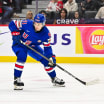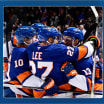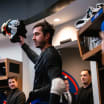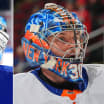If ever the Islanders possessed an anti-hero who eternally would be regarded as heroic, David Volek was that man.
Nor would it be a stretch to suggest that Volek, the hockey player, proved to be the ultimate man of mystery. And that was before he even came to Long Island
Maven's Memories: The Legend of David Volek
Stan Fischler recounts David Volek's story from Czechoslovakia all the way to Game 7 vs the Penguins
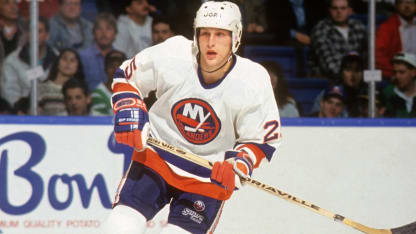
© B Bennett/Getty Images
By
Stan Fischler
Special to NHL.com
Certainly, his route to Uniondale had all the melodramatic moments of a Hollywood thriller.
Plucked by General Manager Bill Torrey in the subterranean depths (208th overall) of the 1984 Entry Draft, Volek had been a rising star in his native Czechoslovakia. David's girlfriend, Alice, was idolized as a champion swimmer.
How the lovebirds wound up chirping happily in Nassau County still astonishes historians who have traced their trek. One explanation of their expedition makes it seem as easy as A-B-C. To wit:
A is for Agent: Edmonton-based hockey rep Ritch Winter already had experience spiriting European players to the NHL. Winter masterminded what became The Volek Spring.
B is for Big Bucks. It was easy to convince young Volek that he could cash in on the bigger-than-ever bankrolls National Hockey League teams were dishing out in the 1980s.
C is for Challenge. David viewed the NHL as the world's best hockey league. It was a worthwhile challenge for the young talent to aim for the top.
MAVEN'S MEMORIES
In Tel Pinchevsky's book, Breakaway, From Behind The Iron Curtain To The NHL, the author relates how Volek's cloak-and-dagger caper succeeded despite obstacles such as Alice's uncertainty about being able to pull it off.
"When we crossed from Czech to Germany," Volek remembered, "Alice was crying at the border."
But she endured the operation with her boyfriend -- later her husband -- that carried them from Germany, and eventually to agent Winter's Edmonton office where the rep, Bow Tie Bill and Volek inked a deal.
Torrey: "I remember when I met him that David already had an Islanders T-shirt on his chest."
Still viewed as a "speculative pick," -- as Ken Rosenblatt wrote in Bleacher Report -- Volek was ready to prove he had the goods when the Nassaumen opened training camp in September.
Onlookers were impressed with what they saw; and what proved to be David's assets throughout four solid seasons of play. Writing in his Hockey History blog, Joe Pelletier cited the things to like about the rookie.
"There was quickness in both his hands and feet," Pelletier noted. "He got off a wrist shot with a quick release and his backhand was lethal. On top of that he had strong legs and good balance. It was hard to knock him off the puck."
Plus, he had confidence. "I liked his attitude," said coach Terry Simpson who figured if he could get 25 red lights out of the rookie. Hence, the coach awarded Volek number 25.
Terry wasn't around very long to savor a season that earned Volek a place on the NHL's All-Rookie team. On December 7, 1988 Al Arbour moved behind the Isles bench, replacing the fired Simpson.
The change didn't brake Volek's progress. He finished his rookie year with 25 goals and 59 points and looked very much like a fixture on offense. Which was good considering the club's dismaying 28-47-5 regular season record.
"David proved that we did right by drafting and signing him," said Bow Tie Bill. "He proved an asset despite our club having its shortcomings."
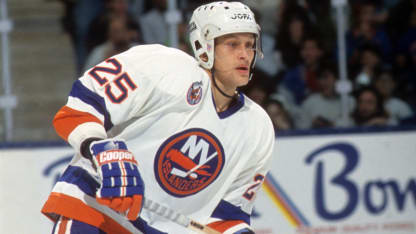
© B Bennett/Getty Images
In a disappointing 1990-91 season. Volek put up 56 points, second-best on the team. Nobody could have known it at the time but on November 13, 1990, Torrey would pull of a trade that eventually affect Volek's hockey life.
In a deal with the Hartford Whalers, the GM dispatched defenseman Doug Crossman to the New Englanders in exchange for a lighthorse forward named Ray Ferraro.
Wearing number 20, Ferraro proved to be a valuable acquisition, not merely as a playmaker but an articulate leader and deadly scorer.
"We knew that Ray would be an asset," said Arbour, "but he surprised us in terms of what he added to the team. We called him 'Radio Ray' because he talked to the media so easily and so often."
By contrast, even on his best nights, Volek displayed what best could be described as a negative charisma quotient. He didn't shun the press but was not as verbally pro-active as Ferraro.
"Not that David was unpleasant or anything like that," said Bob Stampleman, publisher of Action Sports Hockey magazine, "but that he seemed to be a naturally quiet guy."
Still, Volek was regarded as a vital member of a team on the rise. While his club had been buffeted by ill winds, Torrey continued his rebuilding.
New faces such as Pierre Turgeon, Darius Kasparaitis, Benoit Hogue and Vladimir Malakhov gave the team a new dimension and inspired confidence. Plus, goalie Glenn Healy was ready for a career season.
But not necessarily Volek. Somewhere along the line coach Arbour moved him into a "swing" position along with Brian Mullen and Marty McInnis.
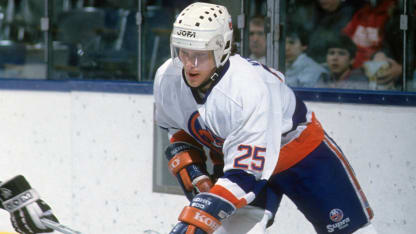
© B Bennett/Getty Images
During 1992-93 he played only 56 games -- 18 fewer than the previous season -- and was benched for long periods of time. Emotionally, it was the lowest point of his professional career.
"I felt that they didn't trust me anymore," he confessed. "That I wasn't valued. But I didn't give up; I was just looking to get another chance."
While David was forcing his way out of his funk, his teammates were pulling off a 1993 playoff surprise. They beat Washington in the first playoff round despite the loss of Pierre Turgeon in the clinching game.
With Turgeon gone and the Islanders next confronting the two-time defending Stanley Cup champion Penguins, the odds were so heavily-tilted against the Nassaumen, it was almost laughable to some in the press corps.
Writing in Newsday, Islanders beat writer Jim Smith predicted that minus Turgeon, Arbour's outfit would not win a single game! Not one.
Who could blame Smith? Injuries began piling up -- Travis Green, Patrick Flatley, among others -- while Arbour searched for reinforcements.
There still were experienced players available. Finally, before Game Three of the Pittsburgh series, the coach pointed his finger at Volek who leaped at the opportunity to replace the injured Patrick Flatley.
Volek: "I knew that with the chance to play, I had to prove to me as well to everybody that I could help. This was the opportunity I was waiting for so I went out and did my best."
To everyone's surprise, Arbour & Company were giving the Champs a hard time. They played fast and with confidence and took the Penguins to where Mario Lemieux did not want to go, a decisive Game Seven.
"We didn't feel pressure," Volek asserted. "We simply played the Penguins game by game; period by period. In a series like that we also were feeding off our adrenaline."
David got what he wanted, "a second chance" and playing on Ray Ferraro's wing it was roughly equivalent to Volek being the bow to Ferraro's Stradivarius violin.
Author and lifetime Islanders fan Zachary Weinstock offers this candid pre-Game Seven view: "Volek certainly was not that Islander we would have asked -- or expected -- to score."
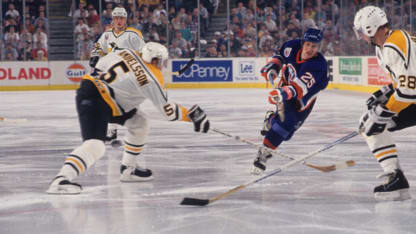
© David E. Klutho/Getty Images
But, remarkably, he did. Ferraro vividly remembered pal David. In the book, The Game I'll Never Forget, Ray told author Chuck O'Donnell, how well he blended with Flatley's replacement. The score was tied 1-1 early in the third period.
Ferraro: "I hadn't played with David at all during the season but with all the injures we had, the lines were a mishmash. Here we were, me and David together in the big one.
"Now we're out there and wound up skating against the Penguins defense -- two on two -- when I dropped the puck to him. He beat goalie Tom Barrasso to put us ahead. We never trailed after that."
The time was 6:10; Isles leading 2-1. Almost three minutes later Benny Hogue scored and it was 3-1 for the Visitors. But the Penguins scored a pair of late ones and the teams repaired to their rooms for sudden-death overtime.
Volek echoed his teammates sentiments: "We were so close. I can't believe we let this one get away."
But the Islanders were sort of like David's season; there still was time for redemption. And so, while injured Patrick Flatley sat in front of a tv monitor in the bowels of the arena, his sub took the overtime ice with Ferraro.
The shot heard 'round the hockey world started with a Penguins miscue -- Ulf Samuelson was caught pinching -- whereupon Volek and Ferraro seized the moment.
"This could be it," Volek muttered to himself as his buddy captured the rubber.
Ferraro: "We wound up with a two-on-one; only defenseman Kjell Samuelson was back, and I had to decide what to do."
Volek: "I was on the right, waiting for Ray to shoot."
Ferraro: "I'd scored a lot of goals in the playoffs and was going to shoot, but Samuelson, a big guy with a long reach, was so close to me that shooting was not an option. Instead, I made a little flip pass to David and he took it in stride."
Volek: "I one-timed it high to the glove side."
Here's how CBC play-by-play announcer Chris Cuthbert called the play:
Samuelson pass off a skate, Volek turns with Ferraro. Here they come, two on one. Volek shoots -- SCORES! David Volek, Islanders, and there'll be a new Stanley Cup champion in 1993!
Author Zach Weinstock called it "The second generation's 'Tonelli to Ny Moment. Volek entered the Pantheon of Islanders Unsung Overtime Heroes."
It was David's finest hour. Midway through the next season, doctors discovered a herniated disk in his back. Surgery was successful but the Islanders Man of Mystery never played an NHL game again.
An anti-hero from start to finish, David Volek!

